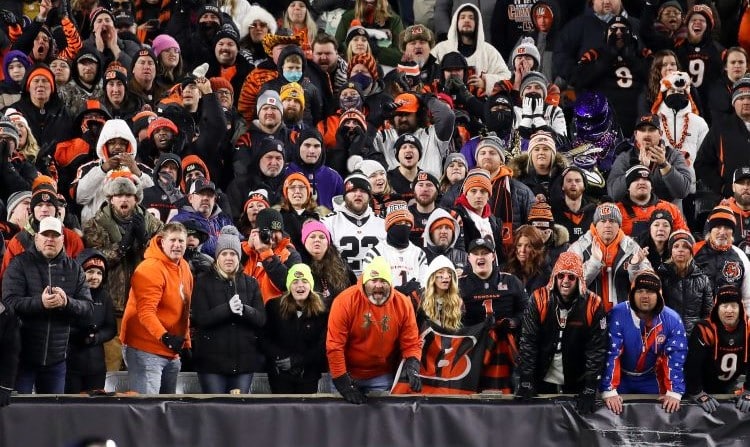A lot of eyes in the sports betting industry across America will be on Ohio Tuesday, as the Ohio Casino Control Commission is planning to release its first report on how much the state’s residents are betting and how much revenue is being generated from it.
State regulators across the U.S. release such financial summaries on a monthly basis, and the Ohio commission has deemed the last weekday of each month as the date to release numbers for the prior month.
Hence, Tuesday’s first report will cover money taken in and handed back to bettors by the 16 online and 14 retail sportsbook operations that started between Jan. 1 and Jan. 31. The heavy betting that the Super Bowl attracts will not be part of the report.
By all indications, however, the money taken in by Ohio’s operators in January will be a lot. GeoComply, a firm that tracks placement of bets, reported that 1.2 million different mobile betting accounts were active in the first 10 days of the month.
If Ohio is like other states, 90% or more of bets are being placed using smartphones or computers rather than showing up in person at a casino, racino, or sports venue with a sportsbook license.
Unlike most states, Ohio also allows sports betting through kiosks at bars and other lottery retailers. Handle and revenue from that form of betting will not be part of the commission’s summary Tuesday, as the Ohio Lottery reported separately this month that Ohioans wagered $850,336 using that method in January.
That amount will be dwarfed by the hundreds of millions of dollars wagered last month through what are known as Type A (mobile sportsbooks) and Type B (retail sportsbooks) operators.
Where does Ohio fit in?
So just how much betting volume can the report be expected to show? It will be a lot, though not likely to be near top national betting state New York, where sportsbook handle of $1.8 billion has already been reported for January. New York has nearly 8 million more residents than Ohio’s 11.8 million.
Ohio instead should be expected to fit in somewhere among a group of other large Midwestern or Northeastern states where there is a similarly strong passion for professional and collegiate sports (and where a large segment of the public was already accustomed to betting by other means before it became legal).
Some of those are the same states Ohioans living near borders might have been accustomed to visiting before Jan. 1 to take advantage of their earlier adoption of legal wagering.
That group of states, ranked by their recent betting handle, includes:
- New Jersey (population 9.3 million): The national leader before New York went mobile, New Jersey sportsbooks took $1.08 billion in wagers in January.
- Illinois (population 12.6 million): It has not yet reported January betting handle, but its December figure, which is generally roughly comparable, was $1.03 billion.
- Pennsylvania (population 13 million): With 14 online sportsbooks, almost the same number as Ohio, the neighboring state had betting handle of $772.3 million last month.
- Michigan (population 10 million): The border state has 15 digital sportsbooks and reported $490.9 million in January betting.
The question may be whether Ohio punches above its weight and gets into or close to the billion-dollar category like New Jersey and Illinois, or has more modest totals like neighboring Pennsylvania and Michigan.
One thing that could inflate January’s volume — whatever it is — is so many new bettors will have been drawn in last month by the generous welcome bonuses the online operators extend to attract customers. The volume of betting in subsequent months would tend to flatten once new customers have exhausted such offers.
And in Ohio’s case in January, the playoff run by the Cincinnati Bengals would certainly have drawn extra betting.
After January, it is common in any state to begin seeing a drop-off in betting volume — even with Super Bowl betting taking place — due to the end of the vast number of popular NFL and college football games available for wagering.
Revenue will also be a focus
Sports betting handle — the dollar amount in bets taken — is a standard benchmark of comparison in an industry built on volume, where the house edge nearly always ensures profit (although that can be affected by what an operator gives away in promotions).
But revenue is ultimately what matters most, and that fluctuates greatly from month to money depending on the cumulative success of bettors. A good industry benchmark is a 7% “hold” or win rate sought by operators — meaning for every $100 wagered, they return $93 to bettors and keep $7 to cover expenses and any profit.
Many states have been doing better than that, with hold rates often boosted by increasing popularity of harder-to-win parlays with FanDuel and other major operators that heavily promote them. Overall holds of 10% or more of gross revenue in a month have not been uncommon in states.
With Ohio’s 10% tax rate on gross revenue, if there was statewide betting handle of $500 million in January and the hold percentage was relatively high at 10%, the sportsbooks would collectively earn $50 million and see $5 million of that diverted to the state for taxes.
Gov. Mike DeWine has already proposed doubling the tax rate — meaning the state would collect $10 million in that scenario to support public education and other purposes — but such a change so early in the development of Ohio’s sports betting industry has yet to receive any legislative endorsement.
One footnote on Tuesday’s report is that unlike in some states, the Ohio Casino Control Commission is not expected to break down betting handle and revenue by different sports, or by type of betting such as parlays.
It will, however, have separate numbers for each operator. If Ohio is like other states, major companies that heavily market themselves and have familiar brands — notably FanDuel, DraftKings, BetMGM, and Caesars Sportsbook — will represent the vast majority of handle and revenue.
Photo: Ian Johnson/Icon Sportswire/Getty Images








